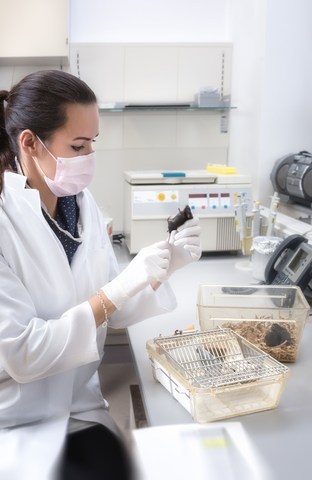Experimental Mesothelioma Treatment Targets Tumor Growth Compounds

Hong Kong researchers have released the first results of an experimental mesothelioma treatment they are working on. The treatment targets organic compounds believed to contribute to mesothelioma growth.
The trial took place at the University of Hong Kong. Mice with mesothelioma received doses of an enzyme inhibitor called DFMO.
The drug appears to stop the production of organic compounds called polyamines. In tests, mice with lower polyamine levels lived longer with pleural mesothelioma.
Enzymes Contribute to Tumor Growth
The growth and spread of pleural mesothelioma is a complex process. It involves many different proteins and enzymes working together. Scientists have not yet identified all of the compounds that contribute to cancer growth.
But the experimental mesothelioma treatment in Hong Kong appears to have hit on one of the key molecules. Polyamines are organic compounds found in all living cells. Polyamines help cancer cells like pleural mesothelioma proliferate rapidly.
Tests on mesothelioma tumors show they produce high levels of an enzyme that raises polyamine levels. This may help explain why mesothelioma grows so fast.
DFMO inhibits that enzyme to keep polyamine levels in check. It is the focus of the experimental mesothelioma treatment.
Mice Receiving Experimental Mesothelioma Treatment Live Longer
The Hong Kong researchers did two types of mouse experiments with DFMO.
One group of mice received DFMO in their water for seven days. After seven days, researchers injected them with mesothelioma tumor cells. This was the adjuvant group.
A second group of mice got an injection of mesothelioma cells first. When their tumors reached a certain size, they got a dose of DFMO. This was the therapeutic group.
In their report on the experimental mesothelioma treatment, the researchers write:
“In adjuvant therapy setting, DFMO suppressed tumor growth and increased median survival…In therapeutic setting, DFMO also suppressed tumor growth…with similar mechanisms.”
At the time of the report, 43% of the mice were considered “long-term” survivors. The researchers conclude that DFMO “may have a potential role as an adjuvant therapy in malignant pleural mesothelioma”.
The treatment was most effective in mice with the epithelioid type of mesothelioma.
DFMO in Experimental Mesothelioma Treatment
DFMO was developed in the 1970s. Early experiments showed that it caused hearing loss at high doses. It had a modest effect on most types of cancer and doctors stopped studying it.
But scientists began looking at DFMO again in the 1990s. Mouse experiments showed it was most effective in cancers caused by carcinogens. Mesothelioma falls into that category because it is caused by asbestos.
Further experiments with DFMO showed it is safer at low doses over a longer period of time.
Sources:
Ho, J.C.M., et al, “Therapeutic targeting of polyamines in malignant pleural mesothelioma xenograft models”, May 26, 2019, Journal of Clinical Oncology, https://ascopubs.org/doi/abs/10.1200/JCO.2019.37.15_suppl.e20060
LoGiudice, N, et al, “Alpha-Difluoromethylornithine, an Irreversible Inhibitor of Polyamine Biosynthesis, as a Therapeutic Strategy against Hyperproliferative and Infectious Diseases”, March 2018, Medical Sciences, https://www.mdpi.com/2076-3271/6/1/12
Mayskens, FL, Jr., Gerner, EW, “Development of difluoromethylornithine (DFMO) as a chemoprevention agent”, May 1999, Clinical Cancer Research, https://www.ncbi.nlm.nih.gov/pubmed/10353725





